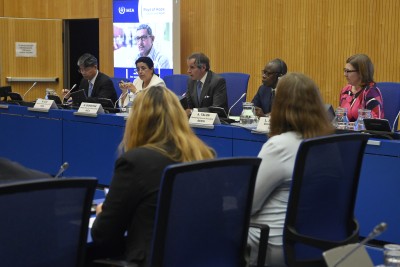IAEA Cancer Care Initiative Receives €9 Million
IAEA has received over €9 million, pledged by six countries, to support its new cancer care initiative, "Rays of Hope". The initiative wants to establish and expand radiotherapy services, with a particular focus on countries, that completely lack facilities for radiation treatment.
 "Rays of Hope" Donor Roundtable was held at the Agency headquarters in Vienna, Austria. / Picture: © IAEA International Atomic Energy Agency / Dean Calma / Flickr Attribution (CC BY 2.0, https://creativecommons.org/licenses/by/2.0/)
"Rays of Hope" Donor Roundtable was held at the Agency headquarters in Vienna, Austria. / Picture: © IAEA International Atomic Energy Agency / Dean Calma / Flickr Attribution (CC BY 2.0, https://creativecommons.org/licenses/by/2.0/)
An initiative launched earlier this year by the International Atomic Energy Agency (IAEA) to address a wide global gap in cancer care has received more than €9 million in pledges from six countries.
Among those six countries are France, Japan, Monaco, the Republic of Korea, Sweden and the United States. According to the IAEA, the money will be used " to purchase life-saving equipment, boost staff skills, and transfer knowledge necessary for averting cancer deaths, 70 percent of which occur in low- and middle-income countries."
According to the International Atomic Energy Agency, the number of cancer-related deaths in the world is expected to increase from 10 to 16 million in the next two decades. Through initiatives such as "Rays of Hope", it is possible to increase access to cancer diagnosis and treatment by 2030, and prevent these deaths.
Director-General Rafael Mariano Grossi said at the Donor Roundtable held at IAEA headquarters in Vienna, "We need to give Rays of Hope the scale and resources required to make a real contribution to a real crisis as we see it in the low and middle-income countries. The demand is growing, and our challenge is to identify the necessary funding and to provide the necessary technical and scientific medical support to make Rays of Hope an effective tool.”
Therefore Director-General Grossi thanked the six countries for their contributions to "Rays of Hope". Grossi expressed his hopes that more IAEA Member States will provide "additional support for this important global cancer care initiative."
The United States helped with the biggest allocation to the IAEA’s “Rays of Hope” Initiative with a total of $7.5 Million. This allocation is part of a larger effort by the United States to improve the lives of people around the world through funding projects that promote the peaceful use of nuclear technology via the IAEA, according to a press release from the U.S. Mission to International Organizations in Vienna.
$7.5 million—thank you, USA, for the generous support to our Rays of Hope #CancerCare4All initiative, to help establish & expand radiotherapy services in Africa & beyond. Too many people die from treatable cancers, your support will help save lives. https://t.co/IgVI45RGGV pic.twitter.com/fO59hiiTA0
— Rafael MarianoGrossi (@rafaelmgrossi) June 14, 2022
France is supporting the IAEA in its initiative with 500,000 euros, the largest sum donated by France to date.
Many thanks to #France for its highest ever amount pledged towards the @IAEAorg’s cancer work — EUR 500,000 in support of common priority countries under Rays of Hope. Merci beaucoup! #CancerCare4All pic.twitter.com/pxK2z1yG98
— Rafael MarianoGrossi (@rafaelmgrossi) June 14, 2022
Rays of Hope
"Rays of Hope" sets out to change that by supporting the establishment and expansion of radiotherapy services, with a particular focus on the more than 20 IAEA Member States that completely lack facilities for radiation treatment.
Benin is one of the countries that is receiving specifically tailored support under the "Rays of Hope" initiative. According to the IAEA, as a result of inadequate resources and late diagnosis, 70 percent of all cancer patients in Benin died in 2018. Many had to seek treatment abroad.
Under "Rays of Hope", the IAEA will provide the country with nuclear medicine equipment and other support to increase patient diagnosis and treatment. The IAEA assistance will be complementary to ongoing national efforts to mobilize resources for the construction of a new cancer hospital, scheduled for inauguration in 2023.
IAEA aid packages include financial estimates that provide donors with information about the need for equipment, staff, training, infrastructure, and two years of operating costs to support planning and sustainability.
In developing aid packages, the IAEA takes into account factors such as the number of new cases per year, the number of required radiotherapy machines, and the number of staff operating the equipment.
The IAEA's goal is to address global inequities in cancer care by providing customized packages to countries in need - those that lack cancer services or are underserved. According to the IAEA, in more than 20 African countries, there is no radiotherapy machine to provide the treatment required by half of cancer patients, so the initial focus has been on Africa.
The complete breadth of IAEA expertise will be incorporated into "Rays of Hope" to help countries diagnose and treat cancer using radiation medicine.



